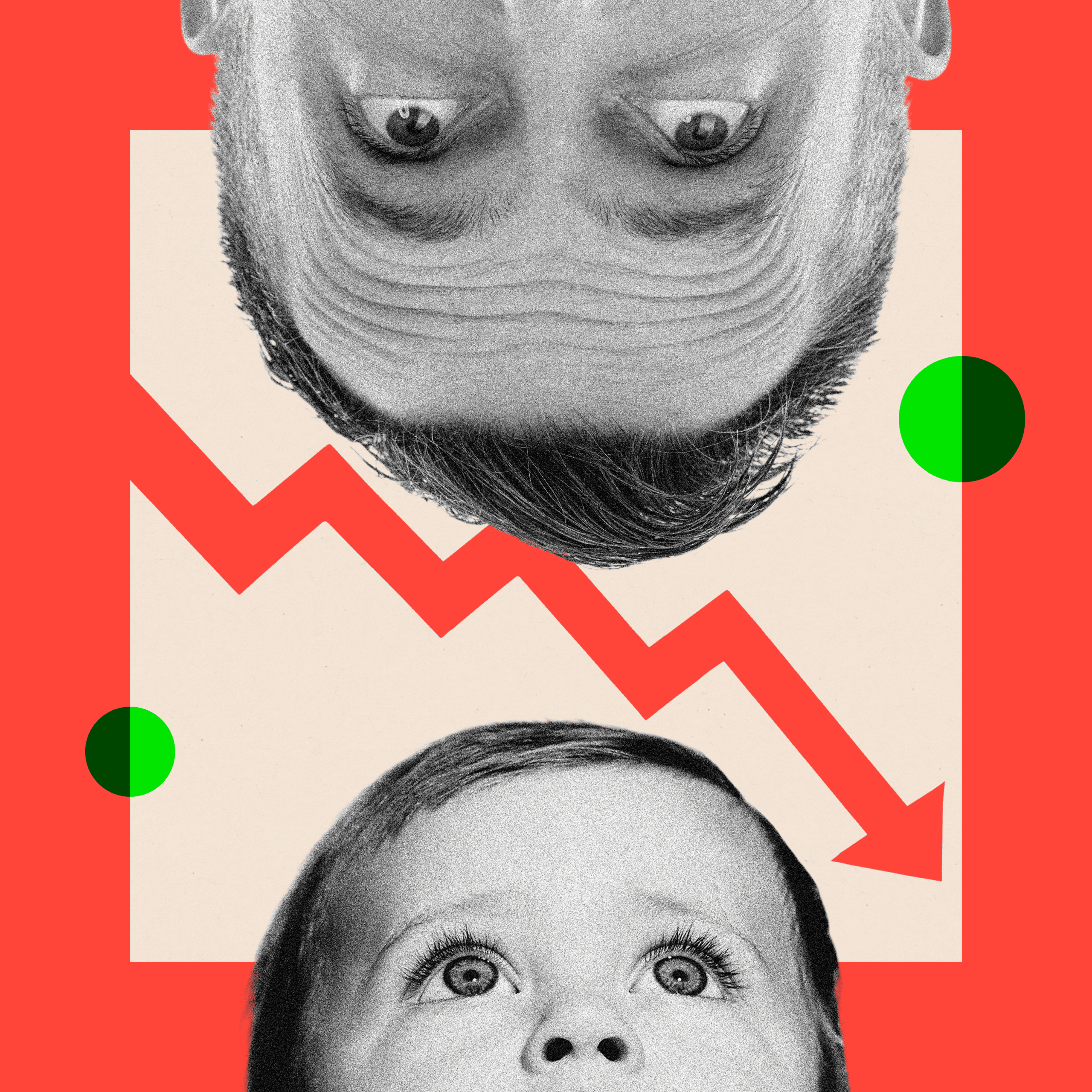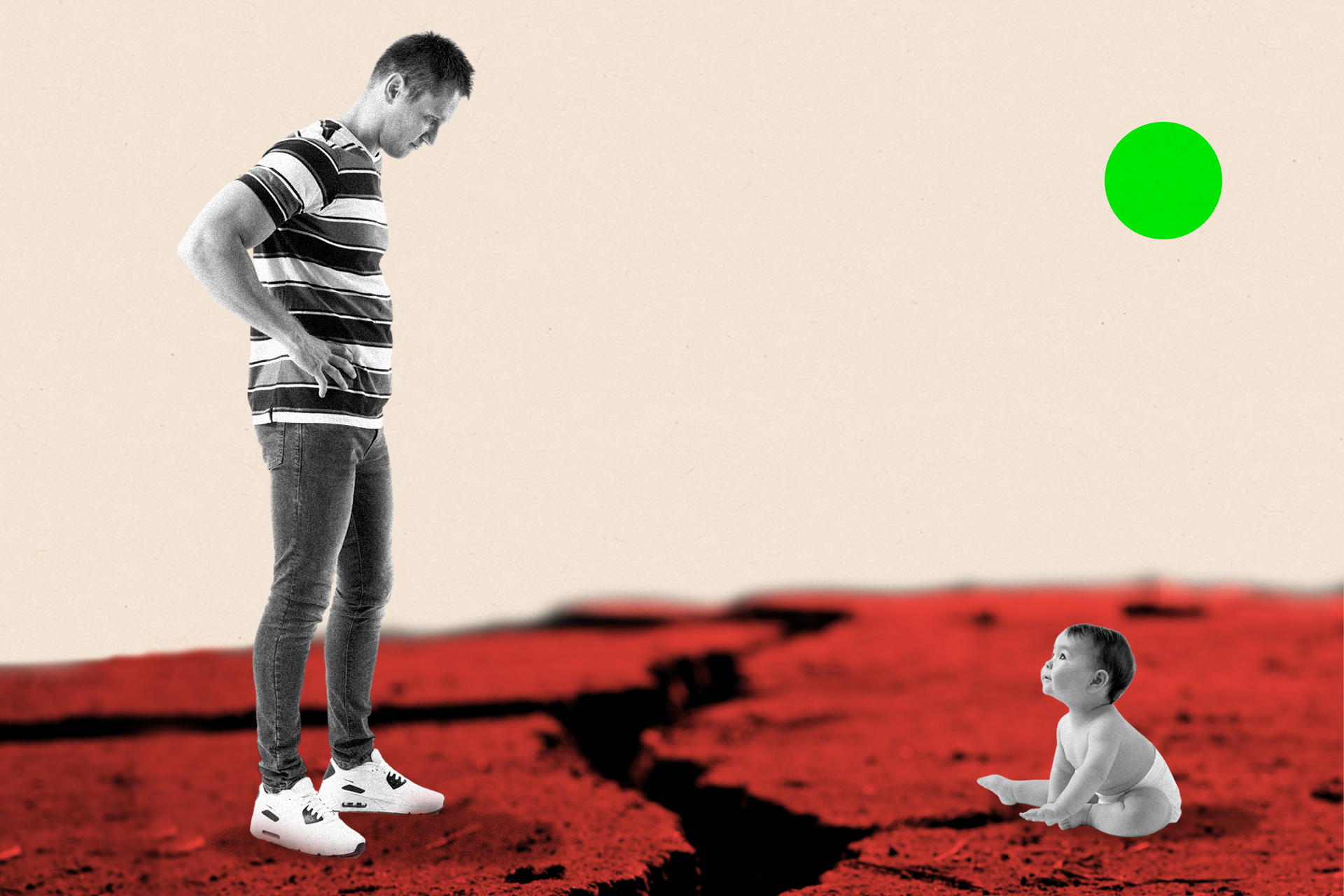
When the US vice-presidential candidate JD Vance made a comment about “childless cat ladies”, he evoked an image of educated, urbanite, career-minded women.
But the picture of who is childless is changing. Recent research has found that it’s more likely to be men who aren’t able to have children even if they want them – in particular lower income men.
A 2021 study in Norway found that the rate of male childlessness was 72% among the lowest five percent of earners, but only 11% among the highest earners – a gap that had widened by almost 20 percentage points over the previous 30 years.
Robin Hadley is one of those who wanted to have a child but struggled to do so. He didn’t go to university and went on to become a technical photographer in a university lab, based in Manchester, and by his 30s, he was desperate to be a dad.
He was single at the time, having married and divorced in his 20s, and was struggling to pay his mortgage, leaving him with little disposable income. As he couldn’t afford to go out much, dating was a challenge.
When his friends and colleagues started to become fathers, he felt a sense of loss. “Birthday cards for kids or collections for new babies, all that reminds you of what you're not – and what you’re expected to be. There is pain associated with it,” he says.
His experience inspired him to write a book looking at why, today, more men like him who want to become fathers do not. While researching it, he realised that, as he puts it, he had been hit by “all the things that affect fertility outcomes – economics, biology, timing of events, relationship choice”.
He also observed that men without children were absent from most of the scholarship on ageing and reproduction – as well as from national statistics.

Childless men who wanted to be fathers are a hidden and disenfranchised population, according to Robin Hadley
Hadley has interviewed other men in Britain who are childless, not by choice. They also expressed sadness and loss, and told him that there was “something missing” in their life.
This week, figures from the Office for National Statistics showed that births in England and Wales fell to an average of 1.44 births per woman, the lowest rate on record. The US birth rate is at a record low, while in 2022 China reported its first population decline in 60 years.
In almost every country in the world, the proportion of people without children is growing. Statistics are gathered differently around the globe and are difficult to compare but rates of childlessness are particularly high in East Asia, at about 30%. In the UK, it’s 18%.
The rise of ‘social infertility’
For some, this is a choice. For others, it is the result of biological infertility, which affects one in seven heterosexual couples in the UK. For many more like Robin, it’s something else, a confluence of factors – which can include lack of resources, financial struggles, or failing to meet the right person at the right time. Some refer to this as “social infertility”.
Anna Rotkirch, a sociologist and demographer at Finland’s Population Research Institute, has studied fertility intentions in Europe and Finland for more than 20 years, and argues that something else may be at play too: she has noticed a profound shift in how we view children.
Like marriage, having a child was once seen as a cornerstone event, something young people did as they embarked on adult life. Now, says Professor Rotkirch, it’s seen as a capstone event – what you do once other goals have been achieved.
Outside Asia, Finland has one of the highest rates of childlessness in the world. But in the 1990s and early 2000s, it was celebrated for battling declining fertility with world-leading child-friendly policies. Parental leave is generous there, childcare is affordable and men and women do a more equal share of domestic work.
Since 2010, however, fertility rates in the country have declined by almost a third.
“People of all different classes seem to think that having a child is adding to the uncertainty in their life,” Professor Rotkirch explains.
In Finland, the wealthiest women are the least likely to end up childless involuntarily, whereas low-income men are the most likely. That’s a big shift from the past. Historically, people from poorer families tended to transition to adulthood earlier – they left education, got jobs and started families at a younger age.
This trend is happening elsewhere in Europe, too. “Now it's actually the most disadvantaged people who are the least likely to start a family because they can't afford it,” adds Bernice Kuang, a demographer at the University of Southampton.
When Dr Kuang surveyed the fertility intentions of young people in the UK, she was surprised by the results. Twice as many 18 to 25-year-olds (15%) now say they will never have children, compared with 15 years ago (7-8%). Many more aren’t sure.
Of all those yet to have children, more than half said they don’t want to or aren’t sure. “That’s a big change from previous generations,” says Dr Kuang.
Those who responded negatively tended to be the most financially insecure. Where young people felt they had a lower standard of living than their parents, they were less likely to want a child.
It makes sense, says Dr Kuang, when you consider that the average age of getting a first mortgage in the UK is the mid-thirties, and parents struggle to find affordable childcare.
“If intentions don't change, it will be a big social change,” she says. “I’d be interested to see if the UK breaks records.”
The crisis of masculinity
For men, financial uncertainty has a compounding impact on involuntary childlessness. It has been called “the selection effect” by sociologists, where women tend to look for someone of the same social class or above when they choose a partner.
“I can see I was batting out of my league intellectually, and in terms of confidence,” says Robin Hadley. “I think on reflection, selection effect could have been a factor.”
In his late thirties, he met his current wife. By the time they were talking about children, they were in their forties and it was too late. But he says that she helped him gain the confidence to go to university and get a PhD. “I wouldn’t be where I am now if it wasn’t for her.”
Women are outperforming men in education in 70% of countries worldwide, leading to what Yale sociologist Marcia Inhorn has called “the mating gap”. In Europe, it means that men without a university degree are the group most likely to be childless.
An invisible demographic
Like most countries, the UK doesn’t have good data on male fertility because they only take the mother’s fertility history when registering a birth. This means that childless men do not exist as a recognised “category”.
Some Nordic countries, however, take both. The 2021 Norwegian study found that a substantial number of men were being “left behind”, arguing that “childlessness is highest among the poorest men”, and that “this inequality in fertility has widened over time”. According to its authors, “while much is already known about female fertility… relatively little is known about male fertility”.
More from InDepth
What the US election outcome means for Ukraine, Gaza and world conflict
- Published29 October 2024
Why tuition fees are set to rise - and what this means for students
- Published28 October 2024
How close were hospitals to collapse in Covid?
- Published28 October 2024
Men’s role in declining birth rates is often overlooked, says Vincent Straub, who studies men’s health and fertility at the University of Oxford.
He’s interested in the role of “male malaise” in fertility decline – the confusion felt by young men as women become empowered in society and expectations of manhood and masculinity change.
The same issues that are causing a crisis in masculinity are also disrupting relationship patterns.
Finland has excellent data on partnerships outside of marriage, and what it shows concerns Prof Rotkirch. In the past, couples would move in together, have a child, get married and have another child. Now couples who live together will break up more often.
As well as the corrosive effect of screentime on relationships, and the pressure of competing careers, there is also a divergence in how couples see their roles in a relationship.
“We’re seeing differences in the expectations of men and women,” says Vincent Straub.
Gender roles are deterring women
Martha Bao is in her 30s and lives in Shanghai, where she works in human resources. She is part of a rapidly growing group of young Chinese women saying no to parenthood.
In 2019, 4.5% of people under 30 in China didn’t want children – two years later, that number had more than doubled to 9.5%. Those statistics don’t differentiate between women and men, but Martha says most of her female friends don't want a child while all of the men do. It's not a surprise, she says, when the burden of looking after children in China is so squarely placed on mothers.
“I think to raise a child means taking on a lot of responsibilities and I don't want to take them on. I want to be free,” she explains.
What can be done?
Another reason for declining birth rates, Straub and Hadley point out, may be the fact that the conversation on fertility focuses almost totally on women. Any policies designed to tackle it are missing half the picture.
Straub believes we should focus on fertility as a men’s health issue and discuss the benefits of caregiving to fathers. “Only one in 100 men in the EU pause their career to look after a child, for women it’s one in three,” he says. That’s despite mountains of evidence that nurturing a child is good for men’s health.
“We need better data,” says Robin Hadley. Until we record men’s fertility, we can’t fully understand it – or the effect it has on their physical and mental health.
And the invisibility of men in fertility discussions extends beyond records. While there’s more awareness now that young women need to think about their fertility, it’s not a conversation being had among young men.
Men also have a biological clock, says Hadley, pointing to research showing that sperm declines in efficacy after 35. And that is something he thinks more young men need to understand.
So making this invisible group visible is one way of tackling social infertility. And another could be to extend the definition of parenting.
All of the researchers who commented on childlessness were keen to point out that people without children still have a vital part to play in raising them.
It's called alloparenting by behavioural ecologists, explains Anna Rotkirch. For much of our evolution, a baby had more than a dozen caregivers.
One of the childless men that Dr Hadley spoke to in his research described a family he met regularly at his local football club. For a school project, the two young boys needed a grandparent. But they had none.
He stepped in as their surrogate grandfather for three years and after that, when they saw him at football, they would say, “Hi grandad”. It felt wonderful to be acknowledged in that way, he said.
“I think most childless people actually are involved in this kind of care, it’s just invisible,” says Professor Rotkirch, “That's not seen in the birth registers, but it's really important.”
BBC InDepth is the new home on the website and app for the best analysis and expertise from our top journalists. Under a distinctive new brand, we’ll bring you fresh perspectives that challenge assumptions, and deep reporting on the biggest issues to help you make sense of a complex world. And we’ll be showcasing thought-provoking content from across BBC Sounds and iPlayer too. We’re starting small but thinking big, and we want to know what you think - you can send us your feedback by clicking on the button below.
Get in touch
InDepth is the home for the best analysis from across BBC News. Tell us what you think.

